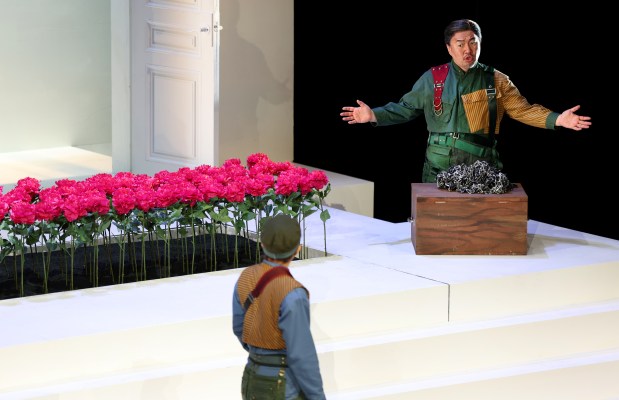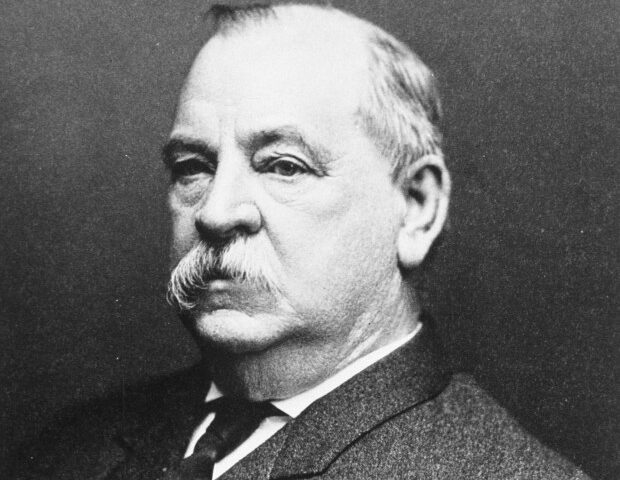In a stroke of collegial brilliance, Lyric Opera and Chicago Opera Theater present two versions of the same story this week: Beethoven’s more famous “Fidelio” (1805, revised through 1814) and his Italian contemporary Ferdinando Paër’s “Leonora” (1804).
That’s good news for opera lovers who want to hear Paër’s rarity in full: These performances mark its North American premiere. The cross billing also allows curious listeners to compare and contrast Paër and Beethoven’s accounts, both based on the same source text and scenario: a woman (Leonore/Leonora) disguises herself as a man (Fidelio/Fedele) to break her husband (Florestan/Florestano) out of jail.
But it’s somewhat bad news for Chicago Opera Theater, which on Tuesday struggled against any comparison — comparisons the company is inviting, mind — to Matthew Ozawa’s brilliant and heartrending “Fidelio,” one of the best productions to open at Lyric in recent memory. Meanwhile, “Leonora” is a conspicuous dip for a company that is typically as inventive as it is resourceful.
Paër’s opera isn’t at fault. No doubt, some familiarity with “Fidelio” — with a refresher across the way at the Civic Opera House — will assist mightily in one’s enjoyment of “Leonora.” Paër’s account is lighter, both tonally and musically: It’s largely a comedy, unlike Beethoven’s more stoic account, and is scored for a tight cast. (No prisoner’s chorus here.)
That score boasts a Mozartean fleetness and clever orchestration. Knocks at the door of the jail are scored with harrumphing chords pounding in sets of four. Later, an unexpected key change underscores Fedele’s revelation that “he” is actually Leonora (soprano Vanessa Becerra). An unusual offstage trumpet heralds the arrival of Don Fernando’s retinue — a detail almost certainly filched by Beethoven for his own “Fidelio,” seeing as he kept a copy of Paër’s score in his personal library.
The Mozart influence is especially potent in “Corri da qualche astrologo” (“Run to some astrologer …”), a “Queen of the Night”–esque coloratura showcase for Marcellina (soprano Keely Futterer), the young woman who haplessly spurns her suitor Giachino in favor of the disguised Leonora. Marcellina’s character takes on a much more central role in “Leonora,” her sassy petulance a far cry from “Fidelio’s” ingénue.
Becerra seizes the daunting title role with a confidence that only swells as the opera goes on. Instead of the conventional pairing of a coloratura with a lyric or dramatic soprano lead, “Leonora” puts its lyric title role through the coloratura ringer, too. Becerra tackles it all with firecracker determination. “I tuoi gemiti dolenti” and “Fiero aquilon furente,” back-to-back arias in the first act, sum up her emotional and vocal prowess, veering from soaring, incandescent lyricism to spiky leaps aplenty.
Overall, however, COT’s penchant for uneven casting strikes again in “Leonora.” Like “Fidelio,” “Leonora” begins with Marcellina pining for Fedele. There and in other arias, like “Corri …,” Futterer’s traversal of the vocal acrobatics could be stiff and harried in the upper register.
Also like “Fidelio,” “Leonora’s” Florestano doesn’t appear until the top of the second act — one of the great entrances in all of opera. Tenor Edgardo Rocha comes short of that drama, his voice lacking the expressive breadth of his colleagues. So did his acting: In a comic scene unique to Paër’s telling, the chained Florestano witnesses a love duet between Marcellina and Leonora-as-Fedele. Rocha played the moment way too straight, watching the proceedings impassively.
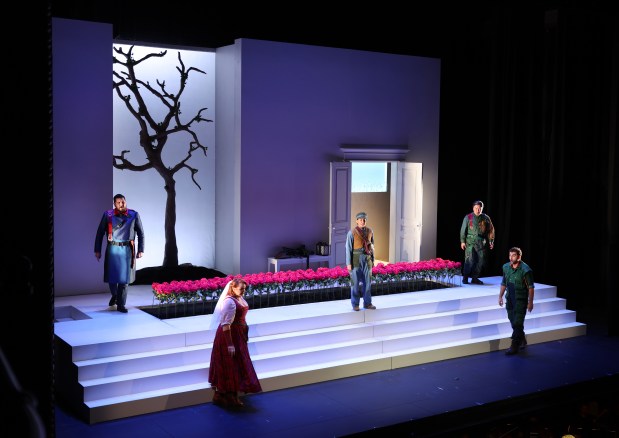
Look just off principal casting, and you’ll find “Leonora’s” jewels. Joo Won Kang perfectly embodies Rocco, Marcellina’s prison guard father, roughing up his enveloping baritone with cranky gruffness whenever it was called for. And it is often called for: “Leonora’s” Rocco is the archetype of a protective father. When Giachino (bass-baritone Alex Soare) whines that Marcellina is playing “hard to get,” Rocco snaps back, memorably, “She has the right!”
As Giachino, Soare is also a find. Though his features are few — the character never gets an aria of his own — his voice is a thing of multifarious sumptuousness. Tenor Matthew Pearce is also a fine Don Pizzarro, the wicked superintendent trying to cover up human rights violations at the prison. His suede-smooth tenor lends Pizzarro a suave charisma that makes his villainy even more ominous. Though singing with less gravitas than his tenor colleagues, Kameron Alston cuts a very tender Don Fernando, the benevolent minister who liberates Florestano.
Chicago Opera Theater has been transparent about its financial challenges of late. But still leaner companies can produce, and have produced, sets that are both economical and immersive. (I’m thinking of Opera Festival of Chicago’s superb “Il prigioniero”/“The Medium” double bill earlier this year.) Cameron Anderson’s set in the first act — an awkward middle ground between period and minimal, and between serious and cartoony — was a swing and a miss. Her rendering of Florestan’s sub-basement holding cell was a vast improvement, strikingly rendered with an angular floor and ominous, trapezoidal lighting fixture.
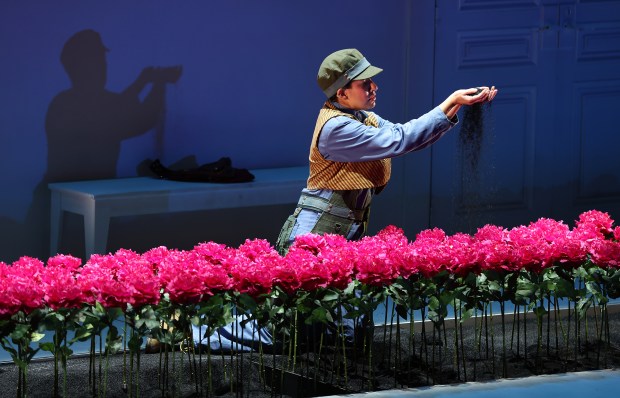
Costuming saw no such about-face, becoming more perplexing as “Leonora” went on. Only Don Pizzarro’s outfit hinted at any time or place, dressing him — rather pointedly — in Napoleonic military regalia. Fedele/Leonora, Rocco and Giachino all wore patchwork factory garb that was a bit Carhartt-meets-Cabbage-Patch-Kids. Don Fernando’s getup is the most bizarre of all, donning a bicolored suit that looks a bit like it was ripped from the closet of an anime villain.
All reflected the direction’s overall inability to reconcile the comic and serious aspects of the opera. “Leonora” has been trumpeted as a company directorial debut for Lawrence Edelson, COT’s new general director. But whenever Edelson’s directing drew attention, it was for unflattering reasons. Vexingly, Edelson had Rocha sing Florestano’s very first lines lying down, deflating the drama of the moment (and not exactly doing wonders for Rocha’s projection). A parallel moment in the first act also has Becerra sing lying on her side behind a bed of flowers. The intent was likely to emphasize the couple’s shared musings on death. The problem: Leonora isn’t even singing about death when she lies beneath the flowerbeds.
Other bungles are less serious and more eye roll-inducing. The showdown in Florestan’s cell reeks of anticlimax, with Don Pizzarro yoinking Leonora’s pistol away from her as casually as one would a toy from a baby. The first act’s “Corri …” has an extended pantomime in which Giachino rushes from offstage to propose to Marcellina, only to be shooed back to the wings — twice. Too bad it wasn’t funny the first time, either.
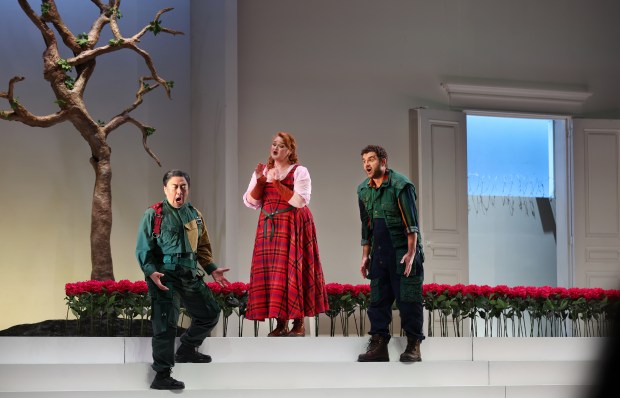
Dame Jane Glover, an old hand in this repertoire, rowed easily through the score with a big, pinwheeling beat. She adroitly toggled between her baton and tasteful continuo accompaniment — played here on fortepiano, a period-appropriate keyboard instrument that reigned between the harpsichord and modern piano. The orchestra never quite matched her tact, though, with general ensemble shagginess and a few abrasive solo features.
Worryingly, Tuesday’s run undersold the Studebaker, the Fine Arts Building’s in-house theater. Great COT productions of the past have stood to benefit from three runs instead of two — like last year’s “Life and Death(s) of Alan Turing,” or 2019’s phenomenal “Moby-Dick.” One hopes the Tuesday date was the only confounding variable so this vital local company can keep going — even if the “going” looks a lot like “rebuilding” these days.
“Leonora” continues 7:30 p.m. Oct. 4 and 3 p.m. Oct. 6 at the Studebaker Theater, 410 S. Michigan Ave.; tickets $60-$160; more information and tickets at chicagooperatheater.org
Hannah Edgar is a freelance critic.
The Rubin Institute for Music Criticism helps fund our classical music coverage. The Chicago Tribune maintains editorial control over assignments and content.


